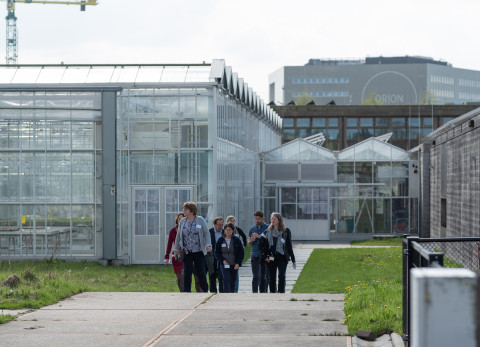Triple 'excellent' score for Dutch ecology

Triple 'excellent' score for Dutch ecology
An independent committee of international researchers has given the Netherlands Institute of Ecology (NIOO-KNAW) top marks in all three categories of its assessment. The findings of the key, six-yearly review have just been published. NIOO-director Louise Vet has welcomed the committee's conclusions. "They're recognition not just of our scientific quality but of our efforts to transfer our knowledge to all parties in society that would benefit."
In its report, the committee has particular praise for NIOO's valuable fundamental research, its state-of-the-art research facilities, its position as a hub in national and international ecology, the inspiring atmosphere it fosters for young researchers and its efforts to make its ecological knowledge available to society at large.
The institute's fundamental research includes are a number of unique long-term projects - some of which have running periods of a century or more - focusing on birds, climate change and biodiversity.
Fundamental research as key
The committee says there's no doubt that NIOO "has a clear added value" in the Dutch and international scientific landscape, and one of its recommendations is for the institute to maintain its focus on fundamental research as a "key component of its uniqueness”. NIOO's parent organisation, the Royal Netherlands Academy of Arts and Sciences (KNAW), and NIOO's own Science Advisory Board have both expressed broad agreement with this recommendation.
The committee used the standard protocol for evaluating the quality and relevance of research units in the Netherlands (SEP) in order to ensure maximum comparability with other institutes.
In addition to its substantive assessment, it handed out marks in three categories: research quality, relevance to society and the viability of the institute. On a scale from one to four one is the top mark, denoting 'excellence'. With a triple 'excellent' score, NIOO is among the world's most influential ecological research units.
(Text continues below pictures)
Science of the 21st century
According to the committee, the relevance to society - i.e. businesses, government and the general public - of NIOO's multidisciplinary research is beyond any doubt. "Ecology is the science of the 21st century", says director Louise Vet. "We're happy to see that the committee fully supports us in this."
Practical applications of the institute's ecological knowledge can be found in the necessary move towards more sustainable food production including the use of natural pest controls, efforts to restore water quality and biodiversity, and the search for new approaches to and solutions for climate change.
Further examples include innovative ways to find new antibiotics, and 'circular' construction as embodied by NIOO's award-winning building. Of course without ecology, there would be no circular economy to begin with. Which is why NIOO's researchers are frequently invited to give advice to policymakers and others, in the Netherlands and beyond.
Topical issues typically linked to NIOO’s research are the use of soil transplantation as a novel technique for nature restoration, the fight to understand and control toxic algal blooms, the importance of micro-organisms for boosting the resilience of plants and efforts to assess the nature-wide impact of light pollution.
There has also been much public interest in the monitoring of birds by NIOO's Centre for Avian Migration and Demography and in high-profile 'citizen science' projects such as the annual Soil Animal Days, as well as NIOO's coordinating role in the new National Master Plan for Recovering Biodiversity.
Research themes for the future
The committee was struck by the high level of diversity at NIOO. Half the institute's research staff are from countries outside the Netherlands, and both among its researchers and at the managerial level, the large number of strong female role models stands out.
Further praise is reserved in the report for NIOO's decision to develop seven institute-wide research themes, moving beyond the traditional division into departments: Chemical communication, Disease ecology, Eco-evolutionary dynamics, Ecological epigenetics, Global environmental change, Microbiomes and Restoration ecology.
These dynamic themes offer a strong impulse for cooperations at both a national and an international level. They're also a testing ground for new lines of research, anticipating future social and scientific challenges.
With more than 300 staff members and students, the Netherlands Institute of Ecology (NIOO-KNAW) is one of the largest research institutes of the Royal Netherlands Academy of Arts and Sciences (KNAW). The institute specialises in water and land ecology. As of 2011, the institute is located in an innovative and sustainable research building in Wageningen, the Netherlands. NIOO has an impressive research history that stretches back 60 years and spans the entire country, and beyond.
More information
- Director Louise Vet, Netherlands Institute of Ecology (NIOO-KNAW), through tel. +31-317-473400
- Science information officer Froukje Rienks, Netherlands Institute of Ecology (NIOO-KNAW), tel. +31-6-10487481, f.rienks@nioo.knaw.nl




